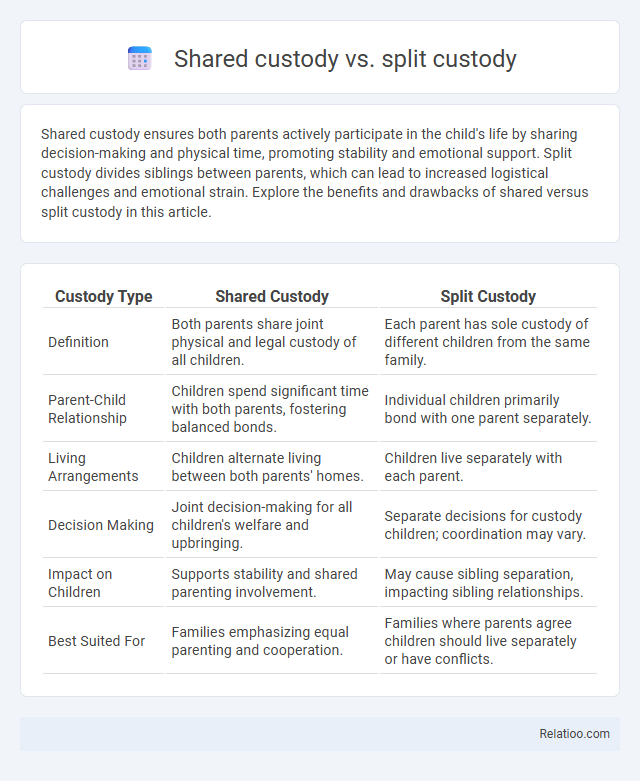Shared custody ensures both parents actively participate in the child's life by sharing decision-making and physical time, promoting stability and emotional support. Split custody divides siblings between parents, which can lead to increased logistical challenges and emotional strain. Explore the benefits and drawbacks of shared versus split custody in this article.
Table of Comparison
| Custody Type | Shared Custody | Split Custody |
|---|---|---|
| Definition | Both parents share joint physical and legal custody of all children. | Each parent has sole custody of different children from the same family. |
| Parent-Child Relationship | Children spend significant time with both parents, fostering balanced bonds. | Individual children primarily bond with one parent separately. |
| Living Arrangements | Children alternate living between both parents' homes. | Children live separately with each parent. |
| Decision Making | Joint decision-making for all children's welfare and upbringing. | Separate decisions for custody children; coordination may vary. |
| Impact on Children | Supports stability and shared parenting involvement. | May cause sibling separation, impacting sibling relationships. |
| Best Suited For | Families emphasizing equal parenting and cooperation. | Families where parents agree children should live separately or have conflicts. |
Understanding Shared Custody
Shared custody involves both parents actively participating in raising their child, ensuring balanced time and decision-making responsibilities, which benefits the child's emotional stability and development. Split custody, where siblings live with different parents, may lead to divided family experiences and heightened adjustment challenges for the children. Understanding shared custody helps Your family create a cooperative environment that prioritizes the child's well-being and consistent nurturing from both parents.
What Is Split Custody?
Split custody involves each parent having full physical and legal custody of at least one child when there are multiple children, allowing children to stay primarily with one parent rather than switching between homes. This arrangement differs from shared custody, where children spend substantial time living with both parents, and sole custody, where only one parent has full custody rights. Understanding how split custody impacts Your family dynamic and children's well-being is crucial in making informed custody decisions.
Key Differences Between Shared and Split Custody
Shared custody involves both parents having joint physical and legal responsibility for their children, ensuring equal or nearly equal time and decision-making authority. Split custody occurs when each parent has sole custody of one or more children, dividing siblings between households. Key differences include the impact on sibling relationships, as shared custody promotes co-parenting and consistent sibling contact, while split custody separates siblings and may complicate visitation schedules.
Legal Considerations in Custody Arrangements
Legal considerations in custody arrangements vary significantly between shared custody, split custody, and sole custody. Shared custody entails both parents having legal and physical parenting time, promoting joint decision-making and equal involvement, often favored when parents cooperate effectively. Split custody, where siblings live separately with each parent, may require detailed legal agreements to address the best interest of each child, while sole custody grants one parent full legal and physical control, typically granted in cases involving safety concerns or parental incapacity.
Pros and Cons of Shared Custody
Shared custody allows both parents to actively participate in raising their child, promoting balanced emotional support and stability for your child. Pros include joint decision-making, consistent routines, and maintaining strong parent-child relationships, while cons involve potential scheduling conflicts and increased communication requirements. This arrangement can be beneficial when parents cooperate well but challenging if conflicts arise.
Advantages and Disadvantages of Split Custody
Split custody involves each parent having sole custody of different children, which allows personalized parenting tailored to each child's unique needs but may lead to sibling separation and logistical challenges during holidays and school events. This arrangement can enhance parent-child bonding individually yet risks increasing emotional stress for siblings due to divided living situations. Comparing to shared custody, which promotes sibling unity but requires high parental cooperation, split custody offers distinct advantages in focused parenting but poses disadvantages in family cohesion and coordination.
Impact of Custody Types on Children
Shared custody allows children to maintain strong bonds with both parents, promoting emotional stability and balanced development. Split custody, where siblings live separately with each parent, may cause feelings of separation and disrupt sibling relationships, potentially impacting emotional well-being. Your child's adjustment depends on the custody arrangement that best supports consistent parenting, stability, and open communication.
Parental Rights and Responsibilities
Shared custody involves both parents having legal and physical custody, allowing equal or near-equal decision-making and parenting time, ensuring balanced parental rights and responsibilities. Split custody divides the children between parents, granting each parent full physical custody of specific children, which can impact the continuity of sibling relationships but enables individualized parental care and decision-making. Custody broadly refers to legal rights and duties regarding a child's care and decision-making, encompassing various arrangements that define how parental responsibilities and visitation rights are allocated.
Deciding the Best Custody Arrangement
Deciding the best custody arrangement depends on the specific needs and well-being of the child, with shared custody allowing both parents to maintain significant involvement, while split custody divides siblings between parents to suit individual circumstances. Evaluating factors such as the child's emotional health, parents' ability to cooperate, and proximity of residences ensures your decision supports stability and growth. Professional guidance from family law experts can help tailor the custody arrangement to best fit your family's unique situation.
Tips for Successful Co-Parenting
Successful co-parenting in shared custody, split custody, or general custody arrangements requires clear communication and consistent scheduling to prioritize the child's well-being. Establishing boundaries and mutual respect ensures both parents contribute positively to your child's upbringing. Utilizing co-parenting apps and mediation services can help reduce conflicts and support seamless coordination between households.

Infographic: Shared custody vs split custody
 relatioo.com
relatioo.com